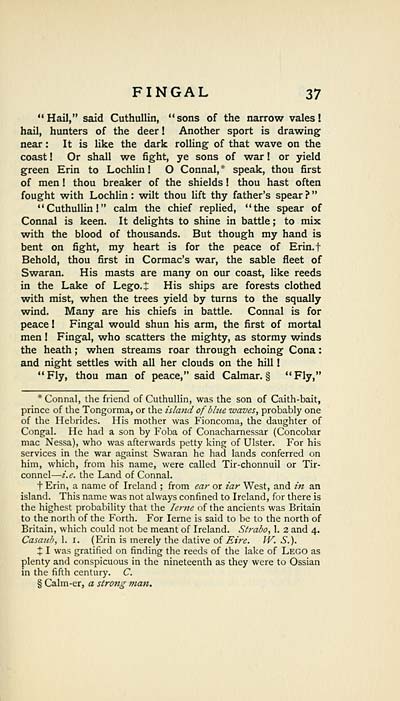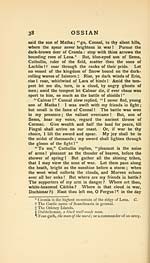Ossian Collection > Poems of Ossian
(65)
Download files
Complete book:
Individual page:
Thumbnail gallery: Grid view | List view

FINGAL 37
"Hail," said Cuthullin, "sons of the narrow vales!
hail, hunters of the deer! Another sport is drawing
near : It is like the dark rolling of that wave on the
coast ! Or shall we fight, ye sons of war ! or yield
green Erin to Lochlin I O Connal, * speak, thou first
of men I thou breaker of the shields ! thou hast often
fought with Lochlin : wilt thou lift thy father's spear ? "
"Cuthullin!" calm the chief replied, "the spear of
Connal is keen. It delights to shine in battle ; to mix
with the blood of thousands. But though my hand is
bent on fight, my heart is for the peace of Erin.f
Behold, thou first in Cormac's war, the sable fleet of
Swaran. His masts are many on our coast, like reeds
in the Lake of Lego.t His ships are forests clothed
with mist, when the trees yield by turns to the squally
wind. Many are his chiefs in battle. Connal is for
peace ! Fingal would shun his arm, the first of mortal
men ! Fingal, who scatters the mighty, as stormy winds
the heath ; when streams roar through echoing Cona :
and night settles with all her clouds on the hill !
" Fly, thou man of peace," said Calmar. § " Fly,"
* Connal, the friend of Cuthullin, was the son of Caith-bait,
prince of the Tongorma, or the island of bhie waves, probably one
of the Hebrides. His mother was Fioncoma, the daughter of
Congal. He had a son by Foba of Conacharnessar (Concobar
mac Nessa), who was afterwards petty king of Ulster. For his
services in the war against Swaran he had lands conferred on
him, which, from his name, were called Tir-chonnuil or Tir-
connel — i.e. the Land of Connal.
t Erin, a name of Ireland ; from ear or iar West, and in an
island. This name was not always confined to Ireland, for there is
the highest probability that the lerne of the ancients was Britain
to the north of the Forth. For lerne is said to be to the north of
Britain, which could not be meant of Ireland. Strabo, 1. 2 and 4.
Casaiib, 1. I. (Erin is merely the dative oi Eire. IV. S.).
X I was gratified on finding the reeds of the lake of Lego as
plenty and conspicuous in the nineteenth as they were to i~
in the fifth century. C.
§ Calm-er, a strong man.
"Hail," said Cuthullin, "sons of the narrow vales!
hail, hunters of the deer! Another sport is drawing
near : It is like the dark rolling of that wave on the
coast ! Or shall we fight, ye sons of war ! or yield
green Erin to Lochlin I O Connal, * speak, thou first
of men I thou breaker of the shields ! thou hast often
fought with Lochlin : wilt thou lift thy father's spear ? "
"Cuthullin!" calm the chief replied, "the spear of
Connal is keen. It delights to shine in battle ; to mix
with the blood of thousands. But though my hand is
bent on fight, my heart is for the peace of Erin.f
Behold, thou first in Cormac's war, the sable fleet of
Swaran. His masts are many on our coast, like reeds
in the Lake of Lego.t His ships are forests clothed
with mist, when the trees yield by turns to the squally
wind. Many are his chiefs in battle. Connal is for
peace ! Fingal would shun his arm, the first of mortal
men ! Fingal, who scatters the mighty, as stormy winds
the heath ; when streams roar through echoing Cona :
and night settles with all her clouds on the hill !
" Fly, thou man of peace," said Calmar. § " Fly,"
* Connal, the friend of Cuthullin, was the son of Caith-bait,
prince of the Tongorma, or the island of bhie waves, probably one
of the Hebrides. His mother was Fioncoma, the daughter of
Congal. He had a son by Foba of Conacharnessar (Concobar
mac Nessa), who was afterwards petty king of Ulster. For his
services in the war against Swaran he had lands conferred on
him, which, from his name, were called Tir-chonnuil or Tir-
connel — i.e. the Land of Connal.
t Erin, a name of Ireland ; from ear or iar West, and in an
island. This name was not always confined to Ireland, for there is
the highest probability that the lerne of the ancients was Britain
to the north of the Forth. For lerne is said to be to the north of
Britain, which could not be meant of Ireland. Strabo, 1. 2 and 4.
Casaiib, 1. I. (Erin is merely the dative oi Eire. IV. S.).
X I was gratified on finding the reeds of the lake of Lego as
plenty and conspicuous in the nineteenth as they were to i~
in the fifth century. C.
§ Calm-er, a strong man.
Set display mode to: Large image | Transcription
Images and transcriptions on this page, including medium image downloads, may be used under the Creative Commons Attribution 4.0 International Licence unless otherwise stated. ![]()
| Early Gaelic Book Collections > Ossian Collection > Poems of Ossian > (65) |
|---|
| Permanent URL | https://digital.nls.uk/82631291 |
|---|
| Description | Selected books from the Ossian Collection of 327 volumes, originally assembled by J. Norman Methven of Perth. Different editions and translations of James MacPherson's epic poem 'Ossian', some with a map of the 'Kingdom of Connor'. Also secondary material relating to Ossianic poetry and the Ossian controversy. |
|---|
| Description | Selected items from five 'Special and Named Printed Collections'. Includes books in Gaelic and other Celtic languages, works about the Gaels, their languages, literature, culture and history. |
|---|

